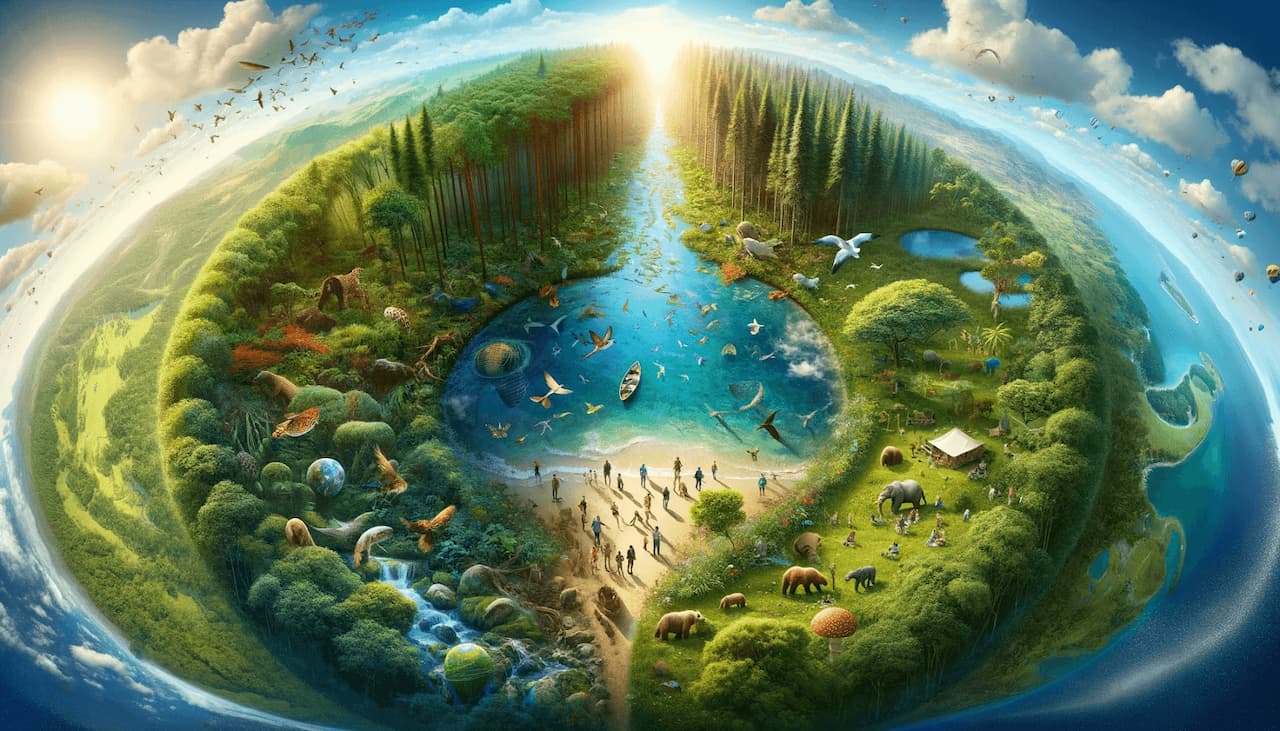3 Main Reasons to Protect Nature

In an era defined by rapid technological advancement and urban expansion, the imperative to protect nature has never been more critical. Nature, with its intricate ecosystems and diverse species, underpins not only the global environment but also human health and economies. The reasons to safeguard our natural world are myriad, but three stand out for their universal impact and urgency: preserving biodiversity, ensuring sustainable resources, and combating climate change. This article explores these pivotal reasons, emphasizing the interconnectedness of human actions and the health of our planet.
- Biodiversity Conservation: Protecting nature ensures the survival of diverse species of plants and animals. Biodiversity is crucial for ecosystem stability, resilience, and the provision of essential services such as pollination, water purification, and disease regulation. Loss of biodiversity can disrupt these services and lead to the collapse of ecosystems.
- Climate Regulation: Nature plays a critical role in regulating the global climate. Forests, oceans, and wetlands act as carbon sinks, absorbing CO2 from the atmosphere and mitigating the effects of climate change. Protecting natural habitats helps maintain this balance, reducing the impact of global warming and extreme weather events.
- Human Health and Well-being: Nature is fundamental to human health and well-being. Natural environments provide resources for medicine, food, and clean water. Additionally, exposure to nature has been shown to reduce stress, improve mood, and enhance physical health. Protecting natural spaces ensures these benefits continue for future generations.
Preserving Biodiversity
Biodiversity, the variety of life on Earth, is more than just an array of plants and animals; it is the foundation upon which ecosystems operate and humans thrive. Each species plays a specific role in its ecosystem, contributing to processes such as pollination, water purification, and carbon sequestration. The loss of biodiversity leads to weakened ecosystems that are less resilient to changes and challenges, including diseases and natural disasters.
The Impact of Biodiversity Loss
The decline in biodiversity poses significant risks to human health and livelihoods. For instance, the reduction in bee populations affects crop pollination, threatening food security. Similarly, the loss of mangroves, which protect against storm surges, increases the vulnerability of coastal communities to hurricanes and tsunamis.
Ensuring Sustainable Resources
Nature is a vast repository of resources that humans have relied upon for millennia. These include water, food, medicinal plants, and materials for shelter and clothing. Protecting natural habitats ensures that these resources remain available not only for current but also for future generations. Sustainable management of natural resources is essential to prevent overexploitation and to maintain the balance of ecosystems.
The Importance of Sustainable Practices
Sustainable practices in agriculture, forestry, and fisheries can yield long-term benefits, including enhanced food security, economic stability, and resilience to environmental fluctuations. For example, sustainable farming practices improve soil health and water retention, leading to higher crop yields and reduced need for chemical inputs.
Combating Climate Change
The protection of natural areas plays a crucial role in the global fight against climate change. Forests, oceans, and wetlands act as carbon sinks, absorbing and storing carbon dioxide from the atmosphere. Conserving these areas and restoring degraded lands are critical strategies for reducing global greenhouse gas levels and mitigating climate change impacts.
Climate Change Mitigation and Adaptation
Nature-based solutions, such as reforestation and wetland restoration, not only sequester carbon but also enhance the resilience of ecosystems and human communities to climate change effects. By protecting natural barriers like coral reefs and mangroves, we safeguard coastal regions against sea-level rise and increased storm intensity.
Reasons and Impacts of Protecting Nature
| Reason | Impact on Ecosystems | Impact on Humans |
| Preserving Biodiversity | Maintains ecosystem functionality and resilience. | Ensures food security and health. |
| Ensuring Sustainable Resources | Prevents resource depletion and habitat destruction. | Supports economic stability and livelihoods. |
| Combating Climate Change | Enhances carbon sequestration and ecosystem adaptability. | Reduces climate-related risks and disasters. |
Conclusion
Protecting nature is not merely an environmental concern but a necessity for human survival and well-being. The reasons to safeguard our natural world—preserving biodiversity, ensuring sustainable resources, and combating climate change—highlight the interconnectedness of life on Earth and the critical role humans play in its stewardship. As we move forward, it is imperative that individuals, communities, and nations adopt practices that prioritize the health of our planet, recognizing that in protecting nature, we protect ourselves.
FAQ
How can individuals contribute to nature protection?
Individuals can contribute by adopting sustainable lifestyles, such as reducing waste, conserving water, supporting eco-friendly products, and participating in local conservation efforts. Educating oneself and others about environmental issues is also crucial.
Why is biodiversity important to human health?
Biodiversity is crucial for human health as it supports the functioning of ecosystems that provide us with clean air, water, and food. It also offers a source of medicines and materials and plays a role in disease regulation.
Can economic development coexist with nature protection?
Yes, economic development and nature protection can coexist through sustainable development, which meets the needs of the present without compromising the ability of future generations to meet their own needs. This approach integrates economic, social, and environmental considerations.